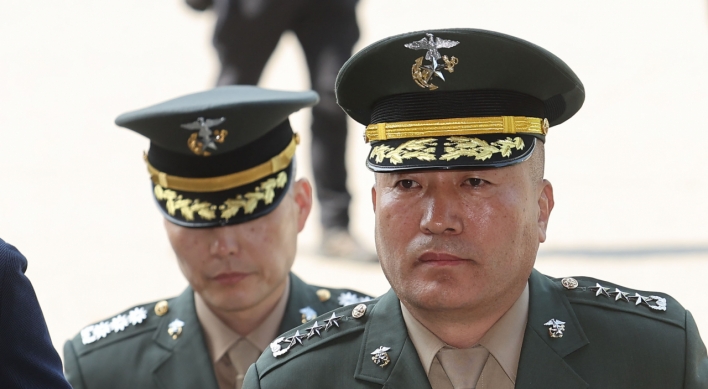U.S. pivot toward Asia unlikely to have quick impact on Korea
By Korea HeraldPublished : Dec. 12, 2011 - 21:03
The Obama administration’s foreign policy “pivot” toward Asia from the Middle East has drawn attention here as many wonder about its implications for the Korean Peninsula.
Some painted a sanguine picture, saying that Seoul’s relations with Washington will deepen and broaden while others expressed concerns that Seoul will be further stuck between the “two whales” amid worsened Sino-American relations.
Some painted a sanguine picture, saying that Seoul’s relations with Washington will deepen and broaden while others expressed concerns that Seoul will be further stuck between the “two whales” amid worsened Sino-American relations.

U.S. Secretary of State Hilary Clinton recently said that the U.S. is pivoting towards the area as “the future will unfold in the Asia-Pacific region.” Some analysts say that this was an attempt to counter the increasingly assertive China.
“As the war on terrorism has ended, the focus of Washington’s foreign policy is shifting toward the Asia-Pacific region,” said Yoon Deok-min, professor at the Institute of Foreign Affairs and National Security.
“This is apparently because U.S. growth in the future will be linked with the vibrant economic dynamics in East Asia, and in some sense, it seeks to keep a rising China in check.”
As part of efforts to strengthen its presence in the region, the U.S. has announced the deployment of 2,500 U.S. marines to Australia, sent Clinton to Myanmar and decided to provide 24 F-16 fighter jets to Indonesia. These countries are of vital strategic value for the U.S. to secure sea lines of communication and its foothold in the Indo-Pacific region.
Regarding the U.S. policy on dealing with North Korea, experts said there may not be any big change in the near future as it is likely to refrain from taking risks amid uncertainties in domestic politics.
“As there is a U.S. presidential election next year and other political variables, there will be some limits for the U.S. government to take any new policy initiative or make any sweeping change,” said Lee Tai-hwan, senior fellow at Sejong Institute.
“Contrary to what the U.S. declared, there would be some restrictions as it seeks to put that into action, given the variables and budget constraints.”
Experts also noted that with the shift in U.S. foreign policy, there would not be any immediate change in the way China deals with North Korea as it seeks “stability” which is crucial for its economic advance.
“While some are inclined to give China credit for pressuring North Korea, that pressure has only been consistent with the Chinese interest in stability,” said Patrick Cronin, senior director of the Asia-Pacific Security Program at the Center for a New American Security.
“As (the sinking of the) Cheonan and (the artillery shelling of) Yeonpyongdo demonstrate, China does not care about what is right or wrong, only stability.”
The recent moves by Washington have triggered concerns that tensions between the U.S. and China could put South Korea in a difficult situation as it should maintain good relations with both to coordinate on trade, North Korea and other issues. But experts anticipated that the pivot will not create any serious conflict.
“As North Korean issues involve nuclear programs, the U.S. may not want any noisy (conflict) with China. There would not be serious differences between the two over the issues surrounding North Korea’s nuclear programs,” said Professor Yoon.
Balbina Hwang, assistant adjunct professor at Georgetown University, said that it is “tactically a big mistake” for the U.S. to signal that the U.S. is retreating from central Asia and the Middle East and returning to Asia.
“The U.S. has always been in Asia. But there is a renewed political emphasis on East Asia. I think it is Obama’s attempt to show he is strong and trying to stand up to China, and it is a huge mistake ... That puts South Korea and Japan in a very difficult position,” she said.
Citing remarks by Oh Kong-dan, research fellow at the Washington-based Brookings Institution, Hwang underscored that Seoul should forget about the negative description of it as the “shrimp among the whales.”
“Korea should think of itself not as a shrimp, but as a dolphin with a lot of flexibility. Whales are so big and cannot maneuver very well. Dolphins, though, have a lot of flexibility. They can maneuver in ways that big huge countries can not,” she said.
“I think Korea rather should think of itself as far more advantageous not as a victim of being small and stuck. Your goal should be what can we do to protect our national interests, do not become a pawn of China (in carrying out its foreign policy).”
Under such changing circumstances in East Asia, South Korea should play a role of a “communicator” between the two global powers as part of efforts to maintain good ties with the two, said Woo Seong-ji, international politics professor at Kyunghee University.
“The two countries are the most crucial ones for Seoul in terms of diplomacy and national reunification. We need to craft policies that could gain support from both of them and try to have strategic talks with them over the issues,” he said.
By Song Sang-ho (sshluck@heraldcorp.com)
-
Articles by Korea Herald



















